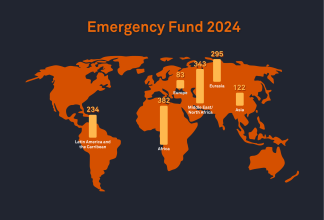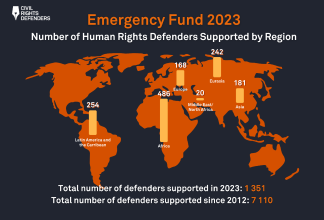34 Years Later, Vietnam Needs Larger Freedom
On the eve of the 34th anniversary of Vietnam becoming a party to key human rights treaties, the human rights situation in the country continues to be marked by the prosecution and imprisonment of human rights defenders, violence against activists and protesters, use of repressive laws to criminalise expression and assembly, and inadequate guarantees to ensure citizens’ right to participate in public affairs, including in land use and environmental decision-making.
On 24 September 1982, Vietnam acceded to the International Covenant on Economic, Social and Cultural Rights (ICESCR) and International Covenant on Civil and Political Rights (ICCPR). Earlier that year, it also ratified the conventions on women’s rights and racial discrimination. By voluntarily becoming a state party to these treaties, Vietnam is under binding obligations to respect, protect and fulfill all human rights without discrimination and ensure access to effective remedies when they are violated by state or non-state actors. The UN Declaration on Human Rights Defenders, adopted in 1998, also requires states to recognise, respect, protect and facilitate the work of individuals or groups who promote and defend human rights.
However, there still remains a considerable gap between Vietnam’s commitments and its actual performance in meeting core human rights obligations under international law and under the 2013 Constitution, which obliges the State to “recognise, respect, protect and guarantee human rights and citizens’ rights”.
In the first nine months of 2016, there have been at least nine trials of activists, all resulting in guilty verdicts. These judicial proceedings failed to meet fair trial standards and led to the sentencing of 17 activists, including ethnic or religious minorities, to a total of more than 84 years in prison. On 20 September, former political prisoner and woman land rights defender Cấn Thị Thêu was sentenced to 20 months’ imprisonment for ‘causing public disorder’ for defending land rights and for participating in peaceful assembly. Yesterday, the Higher People’s Court in Hanoi upheld the March 2016 verdict against blogger Nguyễn Hữu Vinh (known by his pen name Anh Ba Sam) and his assistant Nguyễn Thị Minh Thúy, who were sentenced to five years’ and three years’ imprisonment, respectively, for their involvement in websites that carry information critical of the authorities.
Many activists have been prosecuted under the vaguely-worded Penal Code articles criminalising freedom of expression and assembly. Defendants were generally held in prolonged pre-trial detention, with access to family contact and legal counsel either restricted or denied. The National Assembly amended the Penal Code and Criminal Procedure Code in late 2015 but the provisions inconsistent with international human rights law and standards remain largely intact, including 1999 Penal Code articles 79, 87, 88, 245, and 258. Laws or decrees such as Decree No. 136/2007 on Vietnamese citizens’ exit and entry, draft Law on Associations, draft Law on Religion, Law on Access to Information and Press Law impose restrictions that are not compliant with the two human rights Covenants. Vietnamese citizens, civil society groups, and UN human rights bodies have long been calling for the reform of these existing or draft laws.
Alongside judicial harassment, activists are frequently subjected to physical assaults in police custody and on the street at the hands of authorities. From January to date this year, Civil Rights Defenders is aware of at least 24 incidents of physical violence targeting dozens of activists and dissidents, including family members, perpetrated by public security officers or plainclothes agents believed to be connected to the State. Civil Rights Defenders is not aware of any effective, thorough and impartial investigations into these attacks resulting in the identification and prosecution of both perpetrators and masterminds.
Since April, multiple public demonstrations have taken place in response to a pollution disaster along the central coastal region that decimated marine species and affected more than 200,000 residents whose livelihood depend on the seafood and tourism industries in the region. These environmental protests, and many other protests triggered by land confiscation, have been met with excessive use of force by police. Protesters and independent citizen journalists covering these events have also been arbitrarily detained.
The government has faced criticism, including from some lawmakers, for its slow reaction, inadequate transparency, and potential negligence in oversight over a foreign-owned steel plant found to be responsible for discharging large amount of toxic waste into the affected area. The foreign company apologised and was made to pay a fine, but citizens are pressing for tougher action, including full government accountability and legal actions against the company under the Penal Code. An entire chapter of provisions in the 1999 Penal Code criminalise a range of environmental crimes, including air, water and soil pollution as well as destruction of aquatic resources.
Under article 63 of the Constitution, Vietnam is obliged to ”adopt environmental protection policies” and “encourage all activities for environmental protection.” Under international human rights law and standards, a State has procedural obligations to make environmental information public, to facilitate public participation in environmental decision-making, to protect rights of expression and association, and to provide access to legal remedies. It also has substantive obligations, including to prevent and punish abuses by non-state actors such as companies. Vietnam is one of the countries most vulnerable to climate change, and upholding these obligations is essential to the success of its own plans to address adverse impact.
34 years after Vietnam voluntarily decided to assume the obligations under core human rights treaties, it has taken some steps forward, such as reduction of capital crimes and better recognition of LGBT rights, but many more backwards. Civil Rights Defenders calls on the Vietnam government to listen to the growing domestic demands for better public participation and stronger protection and realisation of human rights, and to take all necessary steps in this regard, including by:
- quashing the convictions of activists and unconditionally releasing all persons detained or imprisoned for exercising their human rights;
- putting an end to violence against activists and protesters and holding perpetrators to account; and
- taking all necessary legislative, policy and other measures to create and maintain a safe and enabling environment for civil society, with full respect for civil, cultural, economic, environmental, political and social rights.
Implementing these measures would move Vietnam closer to fulfilling its constitutional obligations to “promote the People’s mastery” and “pursue the goal of a prosperous people and a strong, democratic, equitable and civilised country, in which all people enjoy an abundant, free and happy life and are given conditions for their comprehensive development.”

